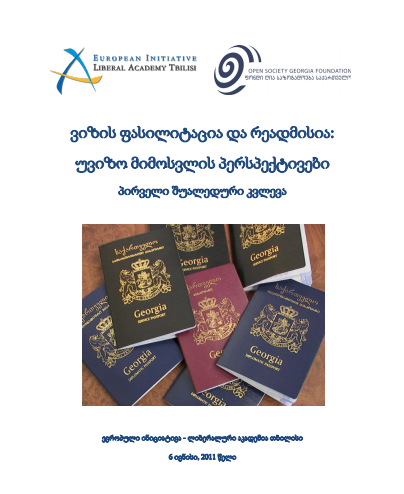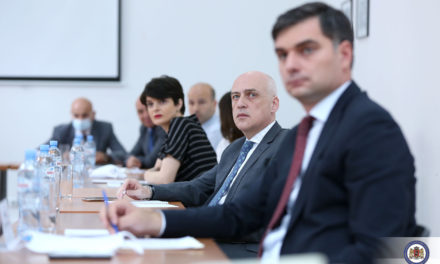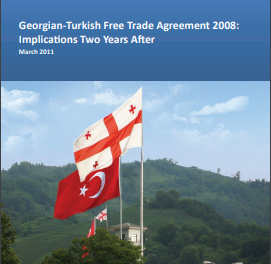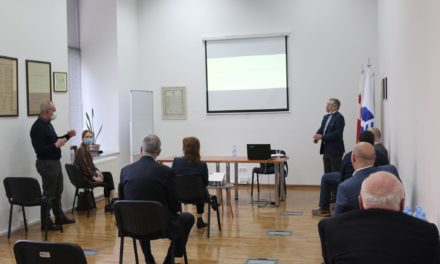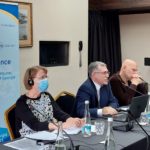In 2010, cooperation between the EU and Georgia on visa regime and mobility entered a new phase. On June 17 of the same year, an agreement on visa facilitation was signed, and on November 22, an agreement on readmission of illegal migrants was signed. These agreements were approved on January 18, 2011 and entered into force in March of the same year. The process started earlier, still within the framework of the European Neighborhood Policy Action Plan. At a summit meeting on 1 September 2008, the European Union committed itself to launching a visa liberalization process. In June of the same year, Georgia launched a dialogue on cooperation on mobility issues. An agreement was reached in November 2009 stating that Georgia was committed to drafting a number of pieces of legislation related to migration issues.
At the initiative of the Eastern Partnership in May 2009, the European Union promised to liberalize mobility for six countries of the former Soviet Union. A precondition for the signing of the agreement was the start of negotiations on the Association Agreement in July 2010, when Ms. Catherine Ashton reaffirmed the above commitment.
Eventually, two agreements were signed, but visa liberalization was still in perspective, which was a good motivation for the Georgian side.
The visa facilitation agreement will facilitate the mobility process in terms of simplifying visa procedures for about twenty (20) categories of citizens, extending the validity of visas and reducing the visa fee (in some cases it is abolished altogether). This change will definitely help to establish relationships between people in the fields of economy, trade, culture, education and others. In addition, change will have a positive impact on the lives of specific people. This applies to people who today face quite different and difficult procedures in the consulates of European countries. These procedures are related to document verification, personal information, time, money and energy. However, people still do not know and are not sure what answer they will get from the consulate and what the final result will be.
In addition, in 2009 the EU adopted the Visa Code, which will soon enter into force and make more effective the quite different procedures required to obtain entry permits in different European countries.
As for the readmission of illegal migrants, it really has economic and social consequences, and this primarily concerns Georgia. This will ensure the implementation of a whole series of reforms, for which Georgian public institutions will have to work hard. The second segment that will be affected is many Georgian families – they are dependent on remittances from family members who work illegally in EU countries (the same applies to third-country nationals who may enter the EU via Georgia and impose responsibility on the readmission party). .
It should be noted that 22.9 percent of the Georgian population is in emigration, 80 percent of them are illegal migrants and the only source of income in the family. Migration for employment is highest in Russia, Turkey and some EU countries.
However, when analyzing cost-effectiveness, we must always keep in mind that such a tandem of agreements is a necessary precondition for the prospect of visa liberalization and may have a positive impact on the interests of both individuals and the development of the country as a whole.
Moreover, if we take into account that since 2001 (EU Directive # 539 of 15 March 2001) Georgian citizens have been on the “black list”, while the Henleck & Partners visa visa index is quite low on the list, the prospect of liberalization becomes even more important.
Given the above, the transition to the “white list” is a significant political and economic success. However, if we take into account the experience of several Balkan countries (Serbia, Macedonia and Montenegro), which were also subject to the visa liberalization regime, we will see that this path is not so easy. These countries have embarked on comprehensive reforms under the Fifty (50) Action Plan.
Thus, Georgia, like the other Eastern Partnership countries, especially Moldova and Ukraine, which started the visa liberalization process in January 2010 In the political sphere as well.
Despite the importance of these issues, the new dynamics of mobility and migration to the EU and related issues are very poorly studied. Much of the public, including politicians, experts, the media and those directly involved in the process, know very little about what benefits they can receive and at what cost.
European Initiative – Liberal Academy Tbilisi thinks that public participation in these processes, including monitoring and decision-making processes, is very important.
The first interim report of the European Initiative – Liberal Academy Tbilisi (in Georgian) describes in detail the basic principles of the two “twin” agreements, which entered into force on March 1, 2011, outlines the obligations and responsibilities of the signatories, examines the actual implementation of these agreements. For direct beneficiaries and presents its own conclusions on how these agreements are enforced three months after their entry into force.
In addition, the Liberal Academy reviewed media outlets, monitored consulates, their visa services, and conducted surveys to determine how well information about new norms is disseminated and understood, how they are interpreted, and how Georgians perceive them. Opportunities and risks.
In addition, for a brief description of the current context, the interim report offers an analysis of the processes and conditions that preceded the current situation. With regard to the visa facilitation agreement, the interim report describes the procedures that were used before the agreement was signed and what is or should be happening from that moment on; Also, the report provides the number of positive and negative responses to the applications submitted to the population of Georgia for EU countries in recent years separately and information on the frequency of arrival of EU citizens in Georgia since 2006, given that the visa regime has been unilaterally liberalized since 2006.
The report sheds light on certain provisions of the EU Visa Code (which came into force in 2010) which sets out new rules for EU “blacklisted” countries that require visas in order to present visa procedures more thoroughly. The report contains the much-needed information about the EU consulates in Georgia – their contact information, website, information on the quality of visa services, etc.
The interim report on the readmission agreement for illegal migrants shows the migration trends that have existed in Georgia for years. About 22.9 percent of Georgia’s population has left the country since the 1990s. Based on this data, Georgia leads the region in the current index of clean migration. The report also outlines the main routes, final location and form of labor migration and provides a brief description of actual and potential migrants; Existing data on remittances to households in Georgia, which account for 7 to 8.5 percent of Georgia’s GDP and equate to about half of household income, further support the statistics on banking operations accumulated and studied over the years. The interim report also contains statistics on the deportation of Georgian illegal migrants from EU countries (as well as other countries) to understand the current perception and fear attributed to the readmission agreement of many illegal migrants.
Mobility Partnerships and related initiatives are important to understand how much it will cost Georgia to receive and reintegrate its own illegal migrants, which in turn will have a strong impact on employment and labor market opportunities.
The concluding section of the interim report provides some findings and conclusions on the practical aspects of the two agreements, the expected and long-term consequences of both facilitated mobility with EU countries, and the impact and implications of tighter controls on illegal migration.
More specifically, the report is an attempt to consider the differing views that exist within the country, some of which overestimate, while others underestimate the importance of the above agreements and outline possible results based on initial analysis and expert opinions.
The first interim report will be followed by a second interim report focusing on the experience of other countries, in particular the practice of Ukraine and Moldova – this will address issues related to visa facilitation and readmission agreements, visa liberalization Which will discuss the prospects for visa liberalization with the EU.

